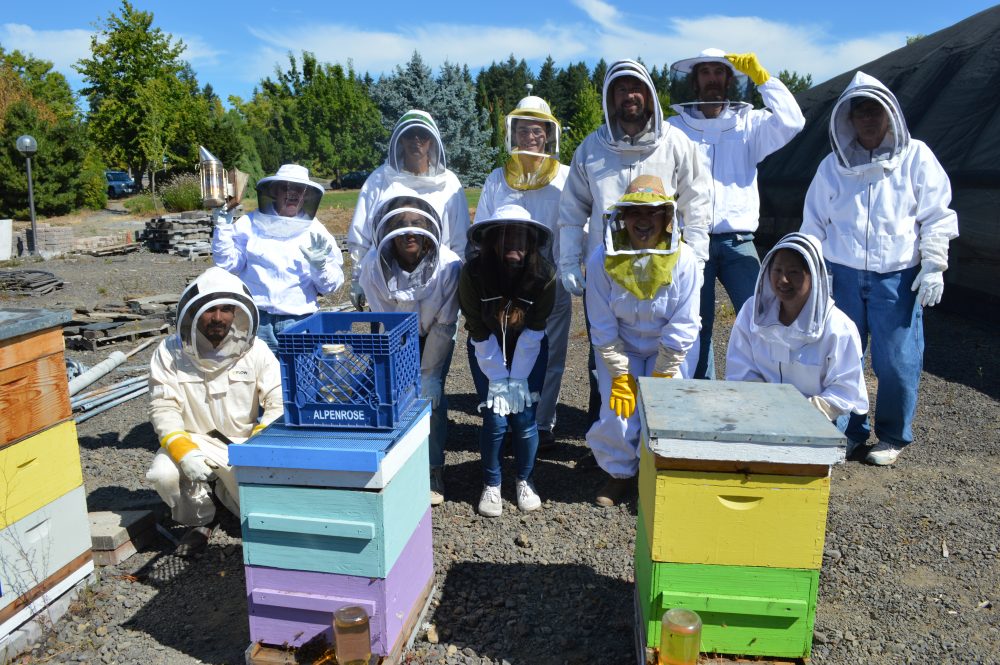Bee Campus USA
Pollinators at Portland Community College
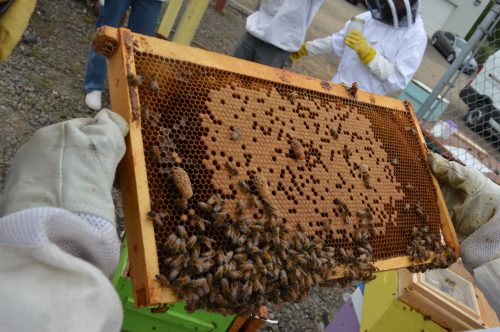 Bees and other pollinators – butterflies, hummingbirds, flies, beetles, and wasps – are an integral part of healthy ecosystems. These pollinators spread pollen to help plants reproduce, promoting biodiversity.
Bees and other pollinators – butterflies, hummingbirds, flies, beetles, and wasps – are an integral part of healthy ecosystems. These pollinators spread pollen to help plants reproduce, promoting biodiversity.
Worldwide, many pollinator species are suffering. Worker bee colonies are particularly in danger as they are affected by colony collapse disorder, a phenomenon that has already resulted in the death of approximately 50% of bee hives in North America. That’s why PCC is dedicated to promoting pollinator health.
In addition to addressing climate change and phasing out destructive chemical pesticides and herbicides, small-scale beekeeping is a critical tool to help address our current bee crisis. Responsible beekeeping provides safe spaces for bees to thrive.
The Rock Creek Campus established an on-campus apiary, which serves as both an educational tool for campus programs and also as a platform for academic research about bees, their habitats, and threats to pollinator persistence. We have since expanded this program to the Sylvania campus, with two hives at the learning garden spring through fall. In addition, we have “boutique” mason bee hotels at our Rock Creek Campus, Sylvania Campus, and Newberg Center to provide habitat for our local solitary bees as well!
PCC is proud to be certified as an affiliate of the Bee Campus USA program.
Beekeeping at PCC
The Rock Creek Campus Apiary
How the bees got started
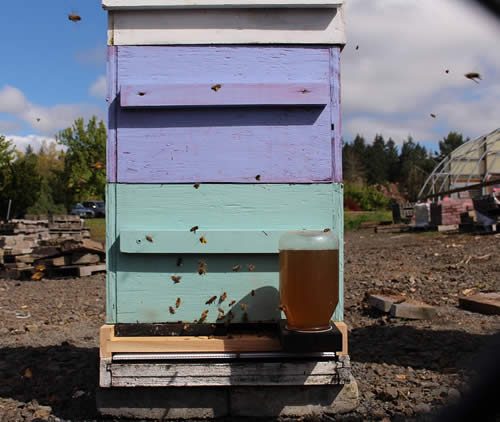
In an effort to increase the bee population on Rock Creek Campus, the Sustainability office established the first hive in our apiary in April 2014. This Langstroth-style hive and its bee colony sparked much campus interest and led to subsequent apiary expansion. The next two hives, Warre and Top Bar styles, are viewing hives, designed with transparent panels to view the work of the bees without disturbing them. The apiary has been relocated to an area adjacent to the campus greenhouses and expanded to eight hives, including a Flow Hive which allows honey to be harvested with minimal disruption to the bees. You can read more about our yearly efforts to enhance the health and habitat of our pollinators in our PCC Bee Campus USA 2021 Annual Report.
Take a tour of the Rock Creek Campus Apiary to learn more about it!
The Sylvania Campus Apiary
Spreading the buzz
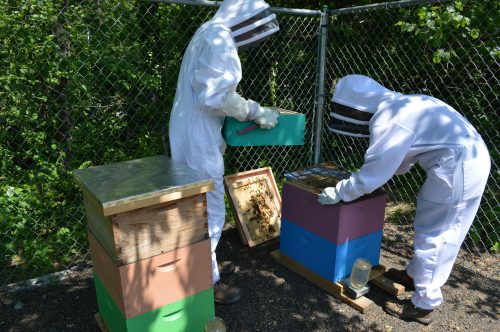
With funding from the Eco-Social Justice Grant, two hives were installed at the Sylvania campus learning garden in April 2018. This is a collaborative effort between the Bee Campus USA committee, Sylvania Learning Garden, and Sustainability Department. The honeybees live at Sylvania spring through fall and head to Rock Creek to over-winter. Students volunteering at and visiting the garden are able to learn more about beekeeping and the important pollinator services provided by bees while the garden gets extra pollinator services!
Mason Bee Boutique Hotels
A new kind of hive
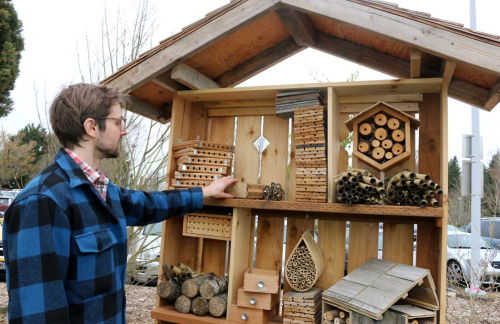
Rock Creek’s 3D Design class collaborated with the Sustainability Office to make prototype homes for Mason Bees to lay their eggs. Oregon alone has over 70 species of Mason Bees, who play a key role in the early spring pollination. These solitary bees nest in small tubes or tunnels, where they lay eggs, store food, and hibernate over winter. The Mason Bee Boutique Hotel is an innovation to support a bee population whose numbers are dwindling due to habitat loss. We now have Mason Bee Hotels at the Rock Creek Campus, Sylvania Campus, and Newberg Center.
Fun fact!
Mason Bees do not have queens. Every female Mason bee is fertile and cares for her own eggs.
BroodMinder: Technology for Bee Education
Modern beekeeping technologies
BroodMinder is a hardware system that allows us to access the temperature inside and outside, humidity, and weight of our hives. This information is imperative to keeping hives healthy and for educating students on the nuances of beekeeping. In the beekeeping class, students learn the optimal temperature, weight, and humidity of the hive and what happens when these requirements are met. The BroodMinder gives live data directly via phone app or online, so we can track the health of the hives without disturbing the bees. This is especially helpful while the bees are overwintering. This hardware gives us the information to make sure the bees have enough food and warmth to get them through the winter months. The BroodMinder is a great tool for students to use while learning how to manage beehives.
Bee Tree Camera: Inner Workings
A bee’s-eye view
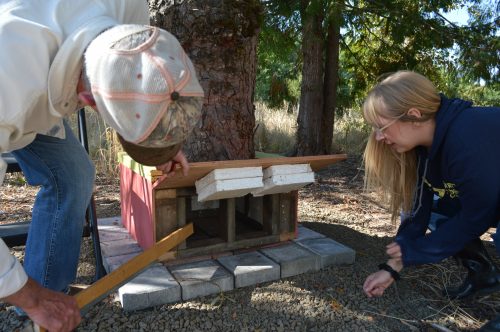
We have the pleasure of working with Steve Krig, a retired engineer and Intel-sponsored Sustainability Creative Fellow, to create a boxed camera designed to safely view the inside of a special hive. The bee tree is on top of a base with a plexiglass top. The camera is below with a view of inside the hive. The Bee Tree lets us observe how the bees build out comb inside a cavity like they do in nature. This project makes for a well-rounded viewing experience for anyone to see the inner workings of a honey bee hive.
Stay tuned for the live feed of the hive!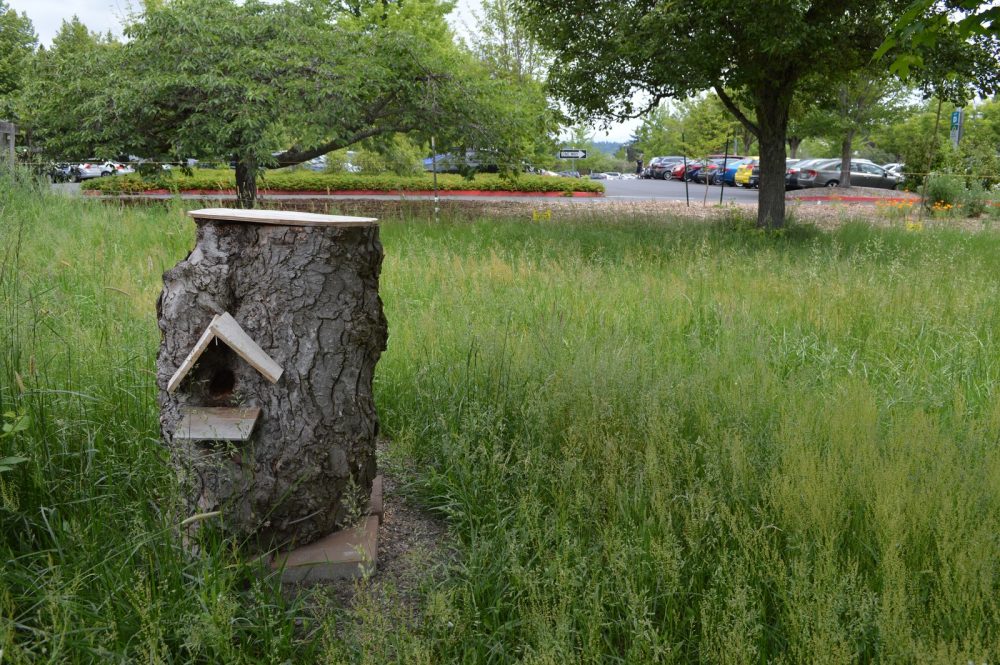
How we use Flow Hive to feed students
Bee Campus USA Certified
A proud partnership
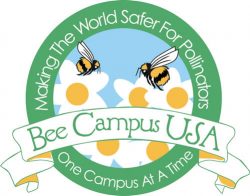 On February 23, 2016, Portland Community College and Bee Campus USA announced that Portland Community College is the fourth institution of higher education in the nation to be certified as an affiliate of the Bee Campus USA program, designed to marshal the strengths of educational campuses for the benefit of pollinators.
On February 23, 2016, Portland Community College and Bee Campus USA announced that Portland Community College is the fourth institution of higher education in the nation to be certified as an affiliate of the Bee Campus USA program, designed to marshal the strengths of educational campuses for the benefit of pollinators.
Being certified with Bee Campus USA is more than just a formality to PCC. The steps required to earn and maintain the Bee Campus USA designation are congruent with our commitment to support pollinator health. The Bee Campus USA designation has helped us focus attention and efforts on increasing pollinator-friendly gardens and landscaping on our campuses and centers and creating opportunities to engage the PCC community and the public in activities focused on pollinator awareness and education.
We are expanding our Rock Creek apiary, strengthening our cross-campus collaborations, and creating more learning opportunities including a new beekeeping class. We look forward to expanding our efforts to contribute to the increased vitality of our pollinators and their habitats.
The Bee Campus USA designation recognizes educational campuses that commit to a set of practices that support pollinators, including bees, butterflies, birds, and bats, among thousands of other species. For more information about the application process for becoming a Bee Campus USA affiliate, visit beecityusa.org. Bee City USA® urges local governments, individuals, organizations, corporations, and communities to promote and establish pollinator-friendly landscapes that are free of pesticides. Since its inception in Asheville, North Carolina in 2012, many more cities have been certified and many others are in the process of preparing applications. For more information about the application process for becoming a Bee City USA community, visit beecityusa.org.
Learn about our current and past efforts:
Getting involved
Students: getting involved
There are many ways for students to get involved and learn more about bees and pollinators. Email the Sustainability Manager to learn more and find opportunities to get involved.
Research
We are working with Jaimie Powell (Biology) on the Oregon Bee Project. This project, managed by the Oregon Department of Agriculture and Oregon State University, is designed to “increase pollinator habitat, safeguard pollinators against pesticide exposure, and increase general awareness about Oregon bees”.
They lead a monitoring team to collect and identify native bees at the Rock Creek Campus. Their results will be included in the Oregon Native Bee Atlas, an extensive study of the bees of Oregon.
Donors: BEE a Bee Supporter!
- Participate – We welcome campus volunteers to join in our efforts. Participate in an event during Pollinator Week each June, tend pollinator habitat on campus, and volunteer in the garden.
- Educate – Learn more about the plight of bees and other pollinators then share the information with your networks. Anyone can make a difference, in big or small ways, and we need everyone to be aware of the threats to the world’s pollinators. Bees are easy to help. Get started today!
- Donate – We need materials, supplies, and bees to grow our apiary.
- Bee Supplies $20
Supports our current bee hives.
Includes pollen patties and sugar for supplemental feedings, feeders, hive tools, smokers, queen excluders, frames, foundation, honey jars, and more. - Mason Bee House $35
Mason Bees, a native bee of our region supports the installation of Mason Bee houses on each campus to attract mason bees. - Pollinator Habitat $50
Help us increase and maintain a healthy pollinator habitat. This provides full-season food sources, pollen, and nectar for our pollinators. - Adopt a Bee Colony $170
Winter is hard on bee colonies, frequently causing significant losses each year. Your support will enable us to replace any we lose and help bolster the strength of our apiary. - Adopt a Flow Hive $440
Our current Flow Hive generates over 3 gallons of honey annually – all harvested without disturbing the bees! Additional Flow Hives allow us to grow our apiary and increase honey production with minimal impact on the hives.
Colony and Hive sponsors will be recognized with signage and apiary visits facilitated by Master Beekeeper Anne.

